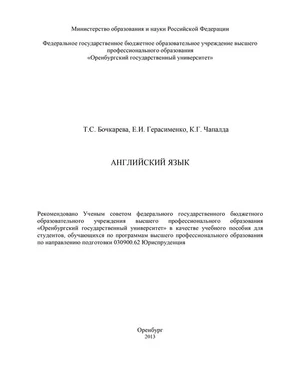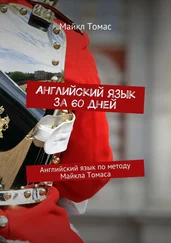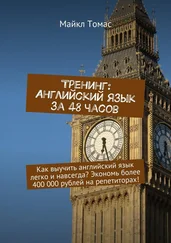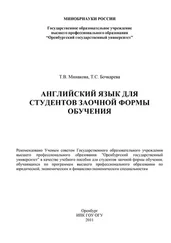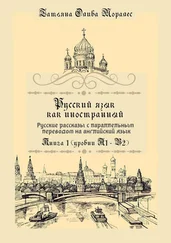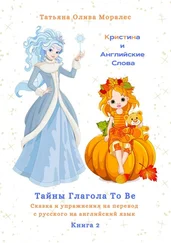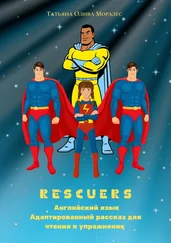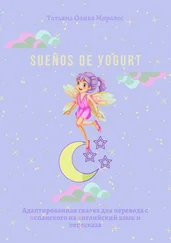Татьяна Бочкарева - Английский язык
Здесь есть возможность читать онлайн «Татьяна Бочкарева - Английский язык» — ознакомительный отрывок электронной книги совершенно бесплатно, а после прочтения отрывка купить полную версию. В некоторых случаях можно слушать аудио, скачать через торрент в формате fb2 и присутствует краткое содержание. Город: Оренбург, Год выпуска: 2013, Издательство: Литагент БИБКОМ, Жанр: Детская образовательная литература, foreign_language, Языкознание, на русском языке. Описание произведения, (предисловие) а так же отзывы посетителей доступны на портале библиотеки ЛибКат.
- Название:Английский язык
- Автор:
- Издательство:Литагент БИБКОМ
- Жанр:
- Год:2013
- Город:Оренбург
- ISBN:нет данных
- Рейтинг книги:3 / 5. Голосов: 1
-
Избранное:Добавить в избранное
- Отзывы:
-
Ваша оценка:
- 60
- 1
- 2
- 3
- 4
- 5
Английский язык: краткое содержание, описание и аннотация
Предлагаем к чтению аннотацию, описание, краткое содержание или предисловие (зависит от того, что написал сам автор книги «Английский язык»). Если вы не нашли необходимую информацию о книге — напишите в комментариях, мы постараемся отыскать её.
Английский язык — читать онлайн ознакомительный отрывок
Ниже представлен текст книги, разбитый по страницам. Система сохранения места последней прочитанной страницы, позволяет с удобством читать онлайн бесплатно книгу «Английский язык», без необходимости каждый раз заново искать на чём Вы остановились. Поставьте закладку, и сможете в любой момент перейти на страницу, на которой закончили чтение.
Интервал:
Закладка:
1.2.2 Переведите следующие слова и выражения на русский язык:
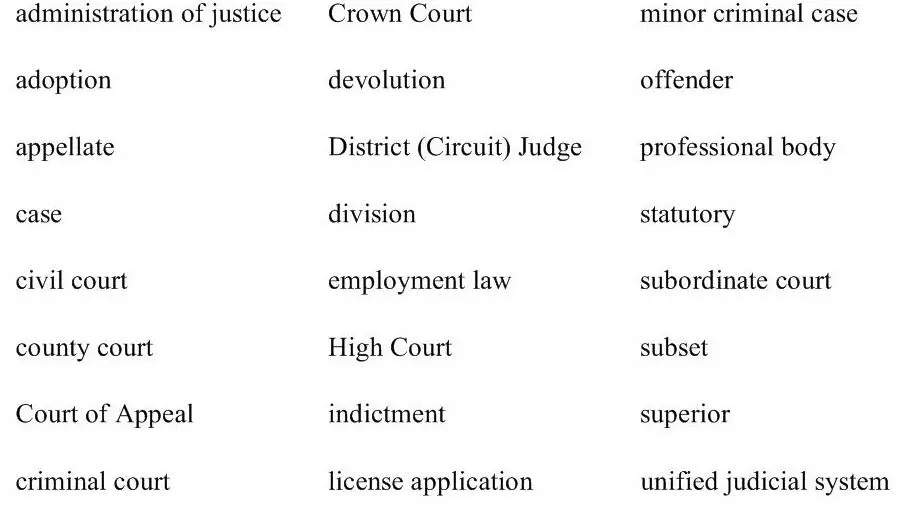
1.2.3 Прочитайте следующие утверждения и укажите, являются ли они верными:
1) Her Majesty's Courts of Justice of England and Wales is the highest appeal court in almost all cases in England and Wales.
2) Her Majesty's Courts of Justice of England and Wales are established under Acts of the Parliament of the United Kingdom.
3) The United Kingdom has a single unified judicial system.
4) The Asylum and Immigration Tribunal's jurisdiction covers the whole of the United Kingdom.
5) The House of Lords is the highest appeal court in almost all cases in England and Wales.
6) The Privy Council is the highest court of appeal for a small number of Commonwealth countries.
7) The Court of Appeal deals only with appeals from other countries.
8) The Crown Court is a criminal court of both original and appellate jurisdiction.
9) The Crown Court was replaced by the Assizes whereby High Court judges would periodically travel around the country hearing cases.
10) Magistrates' Courts deal with offenders aged between the ages of 10 and 17 inclusive.
1.2.4 Переведите текст со словарем.
1.2.5 Составьте 10 вопросов к тексту.
1.2.6 Выберите ключевые предложения, перескажите текст, используя выражения: «The subject of the text is…», «The text deals…», «The main idea of the text is…», «The author comments on …».
1.3 Модуль 3. Текст Law
1.3.1 Прочитайте и переведите текст. Запомните следующие выражения латинского происхождения:
1) actus reus − противоправное действие, правонарушение (физическая, объективная сторона преступления);
2) mens rea – виновная воля;
3) dolus directus – прямой умысел;
4) dolus directus – случайный умысел;
5) pacta sunt servanda – договоры следует соблюдать.
1.3.2 Прочитайте текст и найдите ответы на вопросы:
1) What is law?
2) Can you say anything about the history of law?
Law is a system of rules, usually enforced through a set of institutions. It shapes politics, economics and society in numerous ways and serves as a primary social mediator of relations between people. Contract law regulates everything from buying a bus ticket to trading on derivatives markets. Property law defines rights and obligations related to the transfer and title of personal and real property. Trust law applies to assets held for investment and financial security, while tort law allows claims for compensation if a person's rights or property are harmed. If the harm is criminalized in a statute, criminal law offers means by which the state can prosecute the perpetrator. Constitutional law provides a framework for the creation of law, the protection of human rights and the election of political representatives. Administrative law is used to review the decisions of government agencies, while international law governs affairs between sovereign nation states in activities ranging from trade to environmental regulation or military action.
Legal systems elaborate rights and responsibilities in a variety of ways. A general distinction can be made between civil law jurisdictions, which codify their laws, and common law systems, where judge made law is not consolidated. In some countries, religion still informs the law. In a typical democracy, the central institutions for interpreting and creating law are the three main branches of government, namely an impartial judiciary, a democratic legislature, and an accountable executive. To implement and enforce the law and provide services to the public, a government's bureaucracy, the military and police are vital.
International law can refer to three things: public international law, private international law or conflict of laws and the law of supranational organizations. Public international law concerns relationships between sovereign nations. The sources for public international law development are custom, practice and treaties between sovereign nations, such as the Geneva Conventions. Public international law can be formed by international organizations, such as the United Nations, the International Labor Organization, the World Trade Organization, or the International Monetary Fund. Public international law has a special status as law because there is no international police force, and courts (e.g. the International Court of Justice as the primary UN judicial organ) lack the capacity to penalize disobedience. However, a few bodies, such as the WTO, have effective systems of binding arbitration and dispute resolution backed up by trade sanctions.
Constitutional and administrative laws govern the affairs of the state. Constitutional law concerns both the relationships between the executive, legislature and judiciary and the human rights or civil liberties of individuals against the state. Most jurisdictions, like the United States and France, have a single codified constitution, with a Bill of Rights. A few, like the United Kingdom, have no such document. A "constitution" is simply those laws which constitute the body politic, from statute, case law and convention.
The fundamental constitutional principle, inspired by John Locke, holds that the individual can do anything but that which is forbidden by law, and the state may do nothing but that which is authorized by law. Administrative law is the chief method for people to hold state bodies to account. People can apply for judicial review of actions or decisions by local councils, public services or government ministries, to ensure that they comply with the law.
Criminal law , also known as penal law, pertains to crimes and punishment. It thus regulates the definition of and penalties for offences found to have a sufficiently deleterious social impact but, in itself, makes no moral judgement on an offender nor imposes restrictions on society that physically prevents people from committing a crime in the first place. Investigating, apprehending, charging, and trying suspected offenders are regulated by the law of criminal procedure. The paradigm case of a crime lies in the proof, beyond reasonable doubt, that a person is guilty of two things. First, the accused must commit an act which is deemed by society to be criminal, or actus reus (guilty act). Second, the accused must have the requisite malicious intent to do a criminal act, or mens rea (guilty mind). However for so called "strict liability" crimes, an actus reus is enough. Criminal systems of the civil law tradition distinguish between intention in the broad sense (dolus directus and dolus eventualis), and negligence. Negligence does not carry criminal responsibility unless a particular crime provides for its punishment.
Examples of crimes include murder, assault, fraud and theft. In exceptional circumstances defenses can apply to specific acts, such as killing in self defense, or pleading insanity. Criminal law offences are viewed as offences against not just individual victims, but the community as well.
Contract law concerns enforceable promises, and can be summed up in the Latin phrase pacta sunt servanda (agreements must be kept). In common law jurisdictions, three key elements to the creation of a contract are necessary: offer and acceptance, consideration and the intention to create legal relations.
Читать дальшеИнтервал:
Закладка:
Похожие книги на «Английский язык»
Представляем Вашему вниманию похожие книги на «Английский язык» списком для выбора. Мы отобрали схожую по названию и смыслу литературу в надежде предоставить читателям больше вариантов отыскать новые, интересные, ещё непрочитанные произведения.
Обсуждение, отзывы о книге «Английский язык» и просто собственные мнения читателей. Оставьте ваши комментарии, напишите, что Вы думаете о произведении, его смысле или главных героях. Укажите что конкретно понравилось, а что нет, и почему Вы так считаете.
